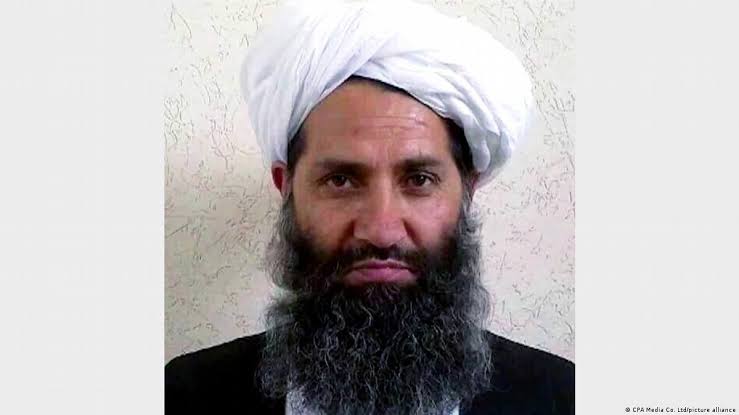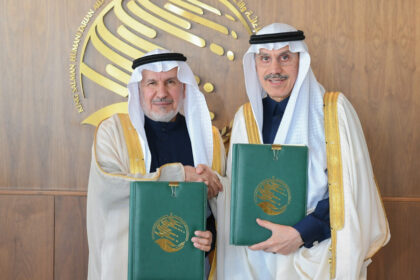RASC News Agency: Twenty-nine months after the Taliban group reasserted control in Afghanistan, Mullah Hibatullah Akhundzada, the leader of this quasi-militant faction, has refrained from public photography or live video addresses. Instead, he sporadically communicates through written media statements or audio messages. Zabihullah Mujahid, the Taliban spokesperson, mentioned in an interview with Nikkei, that the world knows of only one photograph, taken years before assuming leadership for his Afghan identification. Mujahid stated that Akhundzada has appeared publicly at various locations but avoids being photographed or filmed, asserting, “Like many other religious scholars, he believes that taking photos or filming is forbidden in Islam, and that’s why he avoids it.” According to the Taliban’s newsletter, Akhundzada’s latest public appearance was noted during a cabinet meeting on November 20-21 in Kandahar city.
However, some Taliban opponents, both inside and outside the country, claim that Akhundzada is deceased, and an assassin has assumed his identity. Mirwais Afghan, an Afghanistan analyst based in London, stated that suspicions about his vitality have existed since the Taliban regained control, asserting, “I’ve held the view since 2018 that Mullah Hibatullah was killed, and repetitive individuals took his place.” In a profile shared by the Taliban with the media in 2016, it is mentioned that Hibatullah was born on October 18, 1967, in the Panjwai district of Kandahar. Even before assuming leadership in that year, he gained notoriety for issuing fatwas against the United States and its allies.
Sources state that Hibatullah spent over two decades of his life in Pakistan, initially as a refugee and later as a religious scholar and teacher in a religious seminary. People claim he lived in Kochlak, a city near Quetta in Balochistan, Pakistan. Mirwais Afghan told Nikkei that he was killed in an explosion in 2018, and the Taliban dismiss it as “propaganda.” Afghan noted, “The voice of the current man referred to as Mullah Hibatullah is significantly different from the original Hibatullah’s voice.” Taliban officials delayed confirming his successor for over two years after the death of their previous leader, Mullah Omar, in 2013.
However, Sami Yusufzai, another Afghanistan analyst, insists that his voice has not changed, and there is no debate about his existence. Sami stated, “He is alive, and people meet him every day.” Sami added that Taliban leaders, ministers, and Afghanistani citizens have met with him in the past two years. A religious scholar remarked Nikkei, “A few months ago, I encountered him in Kandahar, and his security forces conducted a thorough inspection even before the eyeglass session.” Others asserting to have met Hibatullah claim that he eschews having a chair or desk in his office, preferring to seat himself on the ground.
“Amir al-Mumineen” initiates his work at 8 AM in the office, often persisting until 11 PM, occasionally extending into the early hours of the next day. Mujahid, the spokesperson for the Taliban, elucidated, “His daily activities encompass supervising reports from various Taliban ministries and engaging with officials or other individuals. Akhundzada abstains from television viewing but tunes in to the radio, while his teams monitor television, newspapers, and social media to keep him abreast of the latest developments.” Mujahid conveyed, “The leader aspires to a life akin to that of a mystic, convinced that he can more comfortably attain this lifestyle in Kandahar as opposed to Kabul. He underscored that, notwithstanding the designated locations for the head of state in Kabul, he still opts to reside and work in Kandahar.”
Hibatullah has not publicly encountered any head of state or high-ranking delegation from any country. In May 2023, Sheikh Mohammed bin Abdulrahman Al Thani, the Prime Minister of Qatar, visited Kandahar, and numerous media outlets reported that he engaged in a discussion with Hibatullah.
However, the Taliban spokesperson asserted an inability to confirm such a meeting. A religious scholar mentioned, “At least two suicide bombers are present in the presence of ‘Amir al-Mumineen’ and are ready to sacrifice anything necessary for his security at any moment.”
Since the occupation of Afghanistan, the Taliban has prohibited women from working in the government sector and education, with many human rights activists asserting that Mullah Hibatullah is “anti-women.” Taliban leaders in Kabul told Nikkei Asia that the ban on women’s education and work is solely the leader’s decision, and over 90% of Taliban officials do not endorse it.
Hasina Jalaal, an Afghanistani activist in exile, stated, “He must understand that without supporting women’s rights and their involvement in the government, the international community will neither recognize nor support the Taliban. If the prohibition on women’s work continues, it will have an even more negative impact on the economy, leading to a reduction in economic growth and an increase in poverty and financial problems, especially for women heads of households.”
The Taliban spokesperson once quoted ‘Amir al-Mumineen,’ stating that he is attentive to Afghanistani women. In a recent Pashto statement, Hibatullah said, “If we had wealth, I would give rights to every Afghanistani mother because they do significant work in their homes.”






